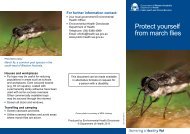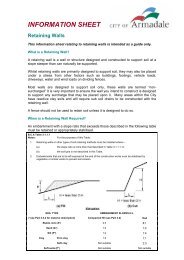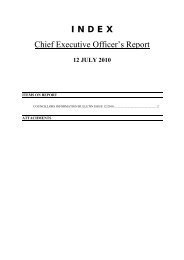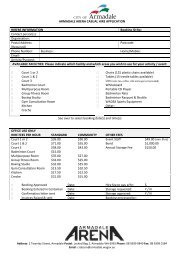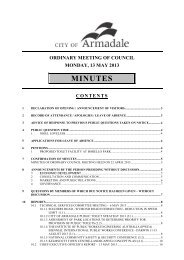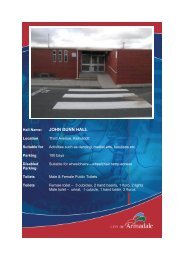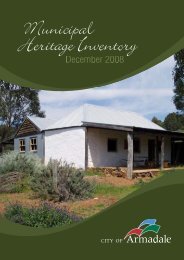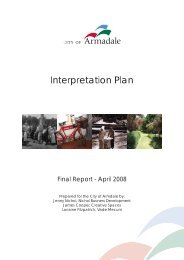Bulletin (PDF 18.3 MB) - City of Armadale
Bulletin (PDF 18.3 MB) - City of Armadale
Bulletin (PDF 18.3 MB) - City of Armadale
You also want an ePaper? Increase the reach of your titles
YUMPU automatically turns print PDFs into web optimized ePapers that Google loves.
Information <strong>Bulletin</strong>Information Items from the Development Services DirectoratePageD-3INFORMATION ITEM – COMMENTS ON ASPECTS OF THE APPROVALS ANDRELATED REFORMS (PLANNING) ACT• Simplicity – the Discussion Paper argued that a major attraction was the elimination <strong>of</strong>ubiquitous dual approvals. Many <strong>of</strong> the submissions from local government demonstratedthis so-called benefit to be a complete myth. From the WALGA survey it was found thatover the past five years only .006% <strong>of</strong> DAs required dual approval and only a quarter <strong>of</strong>these would have been referred to a DAP (since then the threshold has increased to $7mwhich would result in even less DAP applications). Ie from the 15,000 applications in thesurvey only 5 dual approvals a year would have gone to a DAP – quite an argument for theintroduction <strong>of</strong> DAPs!• Transparency – it was claimed that a major benefit <strong>of</strong> DAPs was that decisions would betransparent and publicly accessible. It was particularly galling that the authors appear not tohave known that local government decision making is already open, it is state governmentdecisions that are in camera.• Sustainability – to claim that DAPs would be more sustainable completely strains credulity.Certainly more unsustainable travel would be involved for members, applicants andresidents. It was contended that the involvement <strong>of</strong> independent experts would ensuresustainable decisions – but if experts are so important to ensure that planning decisions areappropriately made how come they didn’t use an expert to draft the DAP Discussion Paper?• Accountability – apparently a benefit <strong>of</strong> DAPs is that they will be subject to a strict code <strong>of</strong>conduct! WALGA’s eloquent response to this reads – “there is nothing accountable about abody that is not in any real way connected to the community for which they are makingdecisions. DAPs are completely removed from local issues, and simply including two tokenlocal government representatives in a minority position does not make up for this isolationfrom community needs and expectations.”• Fairness – the claim that it is somehow fairer for an applicant to be able to seek a review <strong>of</strong>a decision to SAT from a DAP compared with a Council is astonishing.• Consistency – it remains to be seen whether DAPs will result in more consistency. Anumber <strong>of</strong> submissions reported on the relatively high congruence between <strong>of</strong>ficersrecommendations and Council decisions – but it is a dangerous assertion to suggest that<strong>of</strong>ficers are always right on discretionary planning matters! I suspect that the propertyindustry was rather hoping for a little inconsistency if it would assist their project approval!• Suitability – This last “benefit” related to a DAP being able to determine applications formatters <strong>of</strong> state and regional significance. Possibly the author was unaware that for the past50 years the WAPC has had this function. It was also claimed that DAPs would be suitableto determine applications made to a non-performing local government. Perhaps there areunderperforming local governments that need to be brought into line. A number <strong>of</strong> localgovernment submissions magnanimously conceded that decisions possibly should go to aDAP in these situations so one could ask whether the final proposal will address this?Apparently not. The report on submissions clearly states that – “The panels are not intendedto address underperforming local governments”. (p.7)



